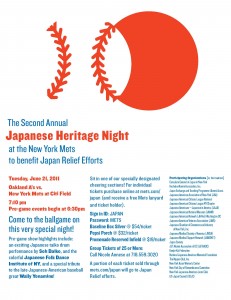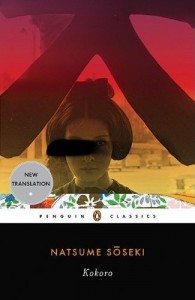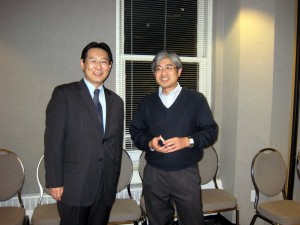JQ Magazine: Film Review – ‘Sword of Desperation’ and ‘The Last Ronin’ at JAPAN CUTS 2011
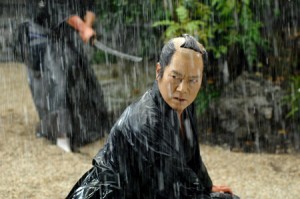
A scene from 'Sword of Desperation,' screened in New York last week as part of the JAPAN CUTS film festival. (Courtesy of Japan Society)
By Paul Benson (Fukui-ken, 2006-08) for JQ magazine. Paul is a New York-based freelance translator who has handled assignments ranging from securities law to cookbooks.
This past week I had the pleasure of seeing two films in Japan Society’s annual JAPAN CUTS film festival. The festival runs from July 7-21, with 32 films (nearly all of them premieres). I was instantly drawn to JAPAN CUTS’ only two jidaigeki 時代劇 samurai films in the series, Sword of Desperation 「必死剣鳥刺し」 and The Last Ronin 「最後の忠臣蔵」. The films were wonderful, and I encourage you to seek them out.
Sword of Desperation (2010, dir. Hideyuki Hirayama) is a poised and powerful film of feudal intrigues and expert swordsmen, a fine addition to the chanbara チャンバラ (“sword-fighting”) genre. Set in the Edo Period (1600-1868), Sword of Desperation has all the genre’s usual devices: a gradual build-up to an outburst of action, an alienated master swordsman, and conflicts of duty and heart.
The film’s first half beautifully establishes the circumstances, characters and their relationships. Etsushi Toyokawa plays the character Sanzaemon Kanemi, a master swordsman, who serves the daimyo Tabu Ukyō (Jun Murakami). At the start of the film (set three years ago), Kanemi murders his master’s favorite concubine, Lady Renko (Megumi Seki), just after the annual spring Noh performance. It soon becomes clear that Kanemi acted to stop Lady Renko from further manipulating the daimyo and damaging the domain’s administration. Kanemi is given a light sentence—a year of house arrest and a meager pay decrease—and he is allowed to return to service afterward. Yet, he soon finds himself losing his wife Mutsue (Naho Toda), faced with the affections of his niece, and lost in the intrigues of others, a situation to which blood is the only way out.
While the pacing of the film might feel disjointed and sluggish to the unfamiliar, anyone acquainted with the chanbara genre is in for a treat. The previous two chanbara films I’ve seen are When the Last Sword Is Drawn 「壬生義士伝」 (2003, dir. Yōjirō Takita) and Sword of Doom 「大菩薩峠」 (1966, dir. Kihachi Okamoto). These didn’t disappoint, and neither does Sword of Desperation. The film has beautiful sets and scenery, a simple but moving plot, and a great twist at the end.
Justin’s Japan: Superstar Sora Aoi Appears This Week at Japan Society’s JAPAN CUTS 2011
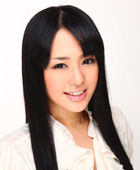
'Three☆Points' star Sora Aoi will appear at New York's Japan Society July 15 with the film's director Masashi Yamamoto. (Courtesy of Japan Society)
After doing boffo box office last week with sold-out screenings of Osamu Tezuka’s Buddha, Battle Royale and the Gantz duology, Japan Society’s JAPAN CUTS 2011 will reach the boiling point this Friday (July 15) with a very special guest: international cause célèbre Sora Aoi. With a career spanning nearly a decade in Japan’s adult video (AV) industry, Aoi (whose stage name translates to “blue sky”) has also moonlighted in television dramas, film and mainstream entertainment, even enjoying success in China as a pop singer.
The actress will appear at Japan Society supporting her latest drama, Three☆Points, with its director Masashi Yamamoto helming a Q&A. The pair will also join a special after party after the screening to meet fans personally. Other Special guests slated for the rest of JAPAN CUTS include The Seaside Motel director Kentaro Moriya, A Liar and a Broken Girl director Natsuki Seta (both July 16), and Haru’s Journey director Masahiro Kobayashi (July 20).
All films—most of them New York premieres–are primarily shown in Japanese with English subtitles, some with actor/director intros and Q&As and after parties.
For more on the remaining cuts, click here.
New Bruce Feiler column in the New York Times
Attached is a new New York Times column (“The Life (and Death) of the Party: Mastering the Art of Dinner Party Conversation“) by JET alum Bruce Feiler (Tottori-ken, 1989-90), author of Learning to Bow, The Council of Dads, and several books on the Middle East including Walking the Bible, Abraham and Where God Was Born.
To read prior columns, please click here.
Bruce’s new book GENERATION FREEDOM: The Middle East Uprisings and the Remaking of the Modern World has just been published. You can see some of his recent media appearances by visiting www.brucefeiler.com.
***************
This Life
The Life (and Death) of the Party
By BRUCE FEILER
Published: July 8, 2011
I CALL it my insufferability test. It came about like this: A number of years ago, I was seated at a dinner party next to the celebrated C.E.O. of an American brewery. I was the lesser player here, so I began asking him questions about his beer. Fifteen minutes passed, then 30. He didn’t ask me a single question.
As dessert approached, I began slumping in my chair from trying to come up with query after query about organic hops and fluctuating wheat futures. Finally, I started dropping in teasers from the year I spent as a circus clown. “My friend the human cannonball …”; “That reminds me of the time I once got into a cage with nine tigers.” Surely these would pique his curiosity. Needless to say, I never told a story about the circus that night.
To me that encounter was a warning shot. I was like a rookie pitcher being plastered in his opening outing in the big leagues. If I hoped to avoid similar dinner party fiascoes in the future, I had to raise my game. So what is the best formula for handling a loudmouth, know-it-all, bore or clam?
With summer entertaining season upon us, it seemed like a good time to brush up on my techniques, and perhaps pick up some new tricks. So with the help of some veterans of the tablecloth trenches, here are some tips for navigating dinner party pitfalls.
EAT AND GREET In ancient Rome, senators hired nomenclatorsto follow them around and introduce them to people. These days, each of us has to be his own nomenclator. A good host often performs this role. “A lot of dinners I throw often have a specific point to them,” said Sunny Bates, a former Silicon Alley headhunter turned networking guru. “I make everyone go around and say who they are, where they’re from and what they most need.” Other starter questions I’ve seen work: “If you could change one thing about the human body, what would it be?” and “What about you, physically, is perfect?” Knowing something about all the other guests is more than good manners; it can also come in handy if you’re seated next to a dud and need to seek relief in someone a few seats away. If I’m at an event with no host at the table, I’ll go so far as to walk around and briefly introduce myself to the other guests. Think of a dinner party as being like a crime scene: plan your escape route. Read More
Japan Fix London: Hyper Japan – Interview with Mary Moreton
Posted by Dipika Soni (Ishikawa-ken, 2003-06). Dipika has recently moved back to London as is currently looking for new work opportunities related to Japan, writing and translation.
——————————————————————————————————————————–
 It’s not surprising that London has changed a lot during the years I’ve been away in Japan. Being the “most populous municipality in the European Union”, rapid development, modernization and globalization are to be expected. However, it still throws me of guard when my British friends now drop ‘katsu-don’, ‘kirin beer’, and ‘kawaii’ into everyday conversation. I know those words weren’t part of my vocabulary before I took off for my life as an ALT!
It’s not surprising that London has changed a lot during the years I’ve been away in Japan. Being the “most populous municipality in the European Union”, rapid development, modernization and globalization are to be expected. However, it still throws me of guard when my British friends now drop ‘katsu-don’, ‘kirin beer’, and ‘kawaii’ into everyday conversation. I know those words weren’t part of my vocabulary before I took off for my life as an ALT!
For a recently returned expat like me, it is a huge comfort to see Japanese culture so widely embraced in my home city. Which is why I was particularly excited to hear about HYPER JAPAN, a three day event promoting all the different aspects of Japanese culture that make it so appealing to us in the west. Determined to get my ‘Japan-fix’ to fight off the homesickness, I applied for a volunteer position and was delighted to discover one of the Hyper Japan team, Mary Moreton, was a fellow ex-JET. Not one to miss a chance to share JET stories, Mary kindly agreed to meet me one soggy London afternoon.
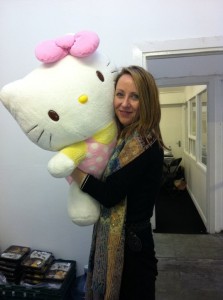 Hi Mary, sorry for dragging you out in this! Could you start by telling me a bit about your time on JET – why you applied, where you were based?
Hi Mary, sorry for dragging you out in this! Could you start by telling me a bit about your time on JET – why you applied, where you were based?
I was a CIR in Aomori City CIR from 2002 – 2005. I studied Classical Japanese Literature at University, which was a really interesting course that I enjoyed a lot, but not necessarily a degree that could lead straight to a clear career path. I wasn’t interested in working in say finance in the city like many of my friends, and I had spent time in Japan before (I did a year out in Osaka), so I decided to apply for JET.
How did you find Aomori compared to your experience of living in Osaka? I would imagine it to be quite different!
Yes, it was completely different to my previous experience of living in the city. I remember in my first week, there was another girl from UK who was based at the kencho, and we decided to meet up and explore one day. We walked around for about 10 minutes until we realised there really wasn’t much to see! It was totally different from my experiences of urban areas such as Tokyo, Osaka and Kobe.
What did you do after JET?
After returning from JET, my first job was as a PA for the European director of a Japanese electronics company where I was working in a mainly Japanese environment. Even though I had left Japan, during my working day, things weren’t too different. Although I felt that my unique point was my Japanese ability, I did not necessarily want to restrict myself to working for Japanese companies. I then went on to work for a British based Insurance broker. I worked in their Japanese department, so I was still using Japanese but not working in a completely Japanese environment as I had been used to. I had always been interested in translation, so in addition to working, I decided to do a part-time MA in translation. In the end I had to quit my job to focus on my dissertation in the last term.
With my MA finished I then decided to do freelance translation and signed up with several Japanese agencies. Not all of them gave regular work, and there were certain areas of translation (technical) that I couldn’t do, but after settling into a good relationship with a few coordinators, I managed to find my niche. Through that I did some work for the Sushi Awards, which led to my current position with Cross Media. Once again I am working as the only native English speaker in a Japanese company, but I enjoy it a lot as I get to promote all the things I love about Japanese culture and cuisine, and share it with a whole new audience.
Could you tell us a bit about the background of Hyper Japan?
 The Eat-Japan Sushi Awards have been around for a few years. Japanese food is a lot more popular now in the UK than when I left in 2002 to go to Japan. Now there are so many places around where you can try Japanese food, and there is a lot more scope to promote it – which is where the idea for the sushi awards came from.
The Eat-Japan Sushi Awards have been around for a few years. Japanese food is a lot more popular now in the UK than when I left in 2002 to go to Japan. Now there are so many places around where you can try Japanese food, and there is a lot more scope to promote it – which is where the idea for the sushi awards came from.
Japanese anime, manga and games have always had a fanbase in the UK and the rest of Europe, and there is a large Japan Expo held in Paris which mainly focuses on these aspects of Japanese culture.
I think most people think that Japan is cool, but not necessarily for just one thing. There are separate events to cater for cosplay, anime, and sushi fans, however there wasn’t anything that brought all these together – which what Hyper Japan attempts to do. In the same way that people who live in Japan experience the old and the modern co-existing harmoniously (you could find a Shinto shrine next door to a pachinko parlor), Hyper Japan aims to showcase both the contemporary and classic sides of Japanese culture under one roof.
To read the rest of the interview, click ‘Read More’.
Read More
JET ROI: “The JET Program’s Finest Hour”
David Jacobson, a former Monbusho Scholar who now works for Seattle-based Chin Music Press (founded by former Monbusho English Fellow Bruce Rutledge), has just posted a really terrific piece titled “The JET Program’s Finest Hour“ about the role of JET and JET alumni in response to the Tohoku Earthquake Disaster. David did a particularly effective job of documenting the topic and pulling information together in a way that had not been done to date. And it demonstrates a very clear “Return on JET-vestment.”
Here’s the link: http://chinmusicpress.com/blog.php?action=display&entryID=13
David comments that the JET Program’s “support this spring, in the aftermath of the devastating March 11 Tohoku earthquake and tsunami, may have marked the program’s finest hour.” And his research helps document information such as:
“Within hours after the disaster, Eric Butler, a former JET who lives in Calgary, Alberta, created a Facebook page, Foreigners from Miyagi. He intended it as a place to discuss how to help the quake victims, but within days it attracted nearly 700 users, many in Japan, and morphed into a forum for those seeking the whereabouts of JETs or others in disaster areas.”
The article also acknowledged and put JETwit’s role in perspective in the larger context:
“Editor (and JET alumnus) Steven Horowitz began a similar effort providing up-to-the minute updates on JETwit, a blog that has evolved into the de facto central information source for the JET alumni community. But he also saw his role as helping JET alums become involved in the relief effort, listing opportunities for volunteers, translators, even offering practical advice for those in Japan. And he recommended that JETs get the word out: “Make yourself available to talk to schools, churches, companies, other organizations. Engage your grad school or college alumni offices. Wear a button that says, ‘Ask Me About Japan.’”
Justin’s Japan: Japan Society’s First Week of JAPAN CUTS 2011 Offers ‘Buddha,’ ‘Battle Royale’

Japan Society of New York's JAPAN CUTS 2011 film festival kicks off with 'Osamu Tezuka’s Buddha: The Great Departure' July 7. (© 2011 Osamu Tezuka’s Buddha Production Committee)
By JQ magazine editor Justin Tedaldi (CIR Kobe-shi, 2001-02) for Examiner.com. Visit his page here for related stories.
Seeking summer movie asylum from Autobots and aging boy wizards? Head to Japan Society.
Now in its fifth consecutive year, the JAPAN CUTS 2011 film festival includes 32 new titles—the biggest lineup in the festival’s history with (almost) nothing but premieres and one-off shows—running from July 7 to 22, including ten co-presentations with the New York Asian Film Festival (NYAFF).
“Arguably North America’s premier showcase for Japanese film” (Firefox News), JAPAN CUTS screens the cutting edge of contemporary Japanese fare, caroming between elegant drama to anything-goes comedy to uncanny experimentalism.
All films—most of them New York premieres–are primarily shown in Japanese with English subtitles, some with actor/director intros and Q&As and after parties.
For the complete list of this week’s cuts, click here.
JQ Magazine: JET Alum Ashley Thompson’s ‘Surviving in Japan’
By Ashley Thompson (Shizuoka-ken, 2008-2010) for JQ magazine. Ashley is the founder of Surviving in Japan (Without Much Japanese) and Lifelines columnist for the Japan Times.
Six years ago, Japan was nowhere on my radar. If someone had told me then that Japan would become my second home, I would have laughed. Japan was foreign, unknown, and I had no interest in it other than its traditional art and history. Plus, I was a homebody—living overseas became a potential option only a few years ago.
After graduating high school in the town I spent most of my life, I moved two hours away (via car) to Seattle for school and work. During that time I met David—a senior at the university I attended for a year while volunteering—who became one of my closest friends. I came to learn that David was born in Japan and spent his childhood there, after which his family moved back to the U.S.
Through David, I learned more about Japan and what I heard piqued my interest. Our volunteer work involved kids, and sometimes they asked David about Japan or he would mention something about it. I visited his family a few times also, and it was obvious that Japan played a significant role in their lives. Occasionally the conversation turned to Japan or good-natured teasing was exchanged in Japanese among their six-member family.
David left for Japan in 2007 as part of the JET Program. At the time, I was finishing my bachelor’s degree in social sciences, taking Japanese for my degree’s foreign language requirement and still working. With my closest friend gone and my time in Seattle then five years and counting, I realized how comfortable I had become. So comfortable, that I realized I was in a rut and decided it was time for a change—a big change.
Over the course of the summer and fall in 2007, Japan and JET were brought to my attention multiple times through random conversations and events, which all started with my dad. I was considering studying abroad in Europe or finding a job overseas, but he said, “Why don’t you try JET?” I laughed it off, assuring him that going to Japan was a ridiculous idea for me—except the idea remained firmly planted in my mind.
JET alums involved in yoga benefit for Japan quake victims (NY)
The below article mentions JETAA U.S.A. Country Rep and former JETAANY President Megan Miller-Yoo (Hyogo-ken). And the reporter, Seana Magee (Okayama-ken, Niimi-shi, 1988-90) also happens to be a JET alum.
FEATURE: New Yorkers turn on heat, use yoga to benefit Japan quake victims
By Seana K. Magee
NEW YORK, June 28, Kyodo
Drenched in sweat, Megan Miller Yoo and about a dozen other students were pushing themselves to new limits during a special Sunday yoga session held at a Manhattan studio.
Stretching their muscles and testing their flexibility, they intently followed the instructor moving through 26 prescribed poses at Bikram Yoga Grand Central in a humid, 40 C room.
From the outside it looked like an ordinary 90-minute Bikram class, but it was not.
The hot yoga devotees were part of a so-called donation class specifically designed to raise money to help victims of the earthquake and tsunami that hit northeastern Japan on March 11.
Yoo explained to Kyodo News how taking part in the special class took her practice to a new level, particularly because of her close ties to the country, where she lived for two years.
”One instructor always says, ‘If you breathe through Bikram, you can breathe through anything,’ so I often think of that when I am in a tough situation, and it makes me realize I can get through anything if I just hang in there and don’t give up,” said the 33-year-old former Japan Exchange and Teaching Program participant who taught English in Hyogo Prefecture.
”I think that is the perfect message for the people in the affected regions of Japan.”
Before the March disaster wreaked havoc in her country, Kyoko Katsura, one of the two studio owners, and her business partner were mulling over ways to motivate students. So they hit upon the idea of offering the weekly donation class to highlight various charities. Read More
Justin’s Japan: Interview with “Tokyo Vice” Author Jake Adelstein on Yakuza Films, Umbrellas
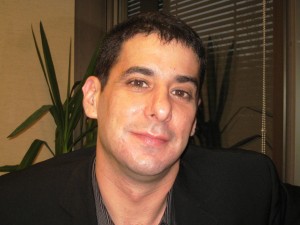
"I think the JET Program is a wonderful thing. Many people who have become scholars of Japan and have settled down in Japan begin on the JET Program. It is a wonderful way for the Japanese to get to understand Americans, and Americans to get to understand Japan." (Justin Tedaldi)
By JQ magazine editor Justin Tedaldi (CIR Kobe-shi, 2001-02) for Examiner.com. Visit his page here for related stories.
Examiner’s note: The following interview was conducted at New York’s Japan Society on March 10, 2011, hours before the Tohoku earthquake and tsunami would ravage eastern Japan. I was there to chat with guest lecturer Jake Adelstein, whose twelve-year career as a crime reporter for the Yomiuri Shinbun was chronicled in his acclaimed 2009 book Tokyo Vice. Adelstein is currently working on his second book, and as the editor of the Japan Subculture Research Center blog he continues to report on all the intriguing and seedy aspects that keep Japan running. In this exclusive interview, I spoke with Adelstein during an ominous cloudburst.
Thanks for meeting in this gloomy weather.
I used to like rainy weather, but my bodyguard, who’s an ex-yakuza, hates rainy weather. And I asked him once—I wish I hadn’t asked him—“What’s your deal with rainy weather? Why do you always not want to go out of the house and discourage me from going out?” And he’s like, “Oh, you know, when a yakuza kills another yakuza, they almost always do it on a rainy day, because first of all: bad visibility. The sound of the rain blurs the sounds of what’s going on, and the rain washes away all the trace evidence.” And ever since then, I haven’t been able to enjoy rainy weather as much as I used to.
I read that your birthday is coming up.
Well, let’s see. I’ll be 42. If all goes well, I will be ordained as a Soto Zen Buddhist priest on my birthday. I’ve got about a week of training left—if I could just remember that damn sutra. I had a talk with the priest and told him that I didn’t believe in the metaphysics of Buddhism, and he was like, “It’s all right. You just have to pretend that they’re true.” So as long as you uphold the precepts, it’s not belief; it’s deeds. I’m comfortable with that, the Episcopal King James version of Buddhism.
In an interview last year, you said you were going to have the opportunity to meet with yakuza boss Goto Tadamasa…
I might still have the opportunity, if he’s in good health. He’s been in and out of the hospital.
That’s his current status?
Yeah. He is still a priest. I’ve had some issues with his autobiography that was published last year, which had the equivalent of a yakuza fatwa on me. If you understand how the yakuza order people to be killed, you can read the lines very well. He refers to the attack on the director Itami Juzo in his memoirs and says, “Of course he deserved to be attacked, because he wrote a movie that was unpleasant about the yakuza,” and he refers to my writing as unpleasant. And then he has these two lines about, “I don’t know who this guy is, but even as an ex-yakuza, if I ever met him he would go from someone being targeted for death to someone being dead, ha-ha-ha.”
When a boss wants someone whacked in the yakuza, what he does is, he never gives an order, because then he could be held responsible. He just says, you know, “Johnson-san is a real pain in the ass; I don’t really like Johnson-san very well.” And his cohort immediately knows that he’s been asked to whack the guy. He whacks him and goes to jail, and comes out and gets a cash bonus from the organization. That’s how it’s done.
There’s talk that a film version of Tokyo Vice is in the works.
John Lesher, who produced No Country for Old Men, is signed on as the producer. There have been two or three actors who have expressed interest in playing the role. J.T. Rogers, who is a very good playwright—he’s got a play opening at Lincoln Center this year called Blood and Gifts—he is the principal screenwriter, and I am the co-writer. J.T. and I went to the same high school together. Actually, it’s interesting: he’s a very successful playwright, writes about Afghanistan and foreign countries. Peter Hessler, who is a China expert, he and I also hung out in high school at the same time.
What are your thoughts on the JET Program?
I think the JET Program is a wonderful thing. Many people who have become scholars of Japan and have settled down in Japan begin on the JET Program. It is a wonderful way for the Japanese to get to understand Americans, and Americans to get to understand Japan. Like any program, it has problems. I think it’s a great thing, and I hope it continues to be supported by both sides.
JQ Magazine: JQ&A with JET Alum Casey Novotny on the Documentary Film ‘100 Yen’
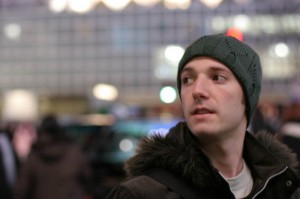
“I can definitely say I owe the experience that got me to this point to my time working as a CIR, and working with enthusiastic young students who want to study abroad during that time has motivated me to continue working in this field.” (Courtesy of Casey Novotny)
By Rick Ambrosio (Ibaraki-ken, 2006-08) for JQ magazine. Rick manages the JET Alumni Association of New York (JETAANY)’s Twitter page and is the creator of the JETwit column Tadaima!
Casey Novotny (Kochi-ken, 2005-08) gave us the inside scoop on 100 Yen, a film about the Japanese arcade scene coming this fall. Casey, who’s currently a program coordinator at Asia University in Tokyo, and director/JET alum Brad Crawford first met as JETs from Canada, and years later collaborated on this original project. Find out what inspired Casey and listen to his predictions for the future of the arcade scene.
How did you find yourself originally interested in Japan? Was it through games?
Yeah, I guess since when I was a child my interest in Japan started through video games, anime and such. The real thing that interested me those things, and thus Japan, was the gaping cultural differences. I really couldn’t grasp how the Japanese way of thinking could be so similar yet so different to ours. There was some weird stuff out there! I mean, there still is, but I think living here for over six years has kind of desensitized me to most of it.
How has Japan influenced your career and personal goals?
The first time I was an exchange student in Japan was when I was seventeen for half a year. That experience definitely changed my life, and I knew I wanted to make a career where I was going to use the Japanese language skills I was learning. At that point I wasn’t sure what kind of career, but I knew I had to improve my language skills and cultural understanding, and so I made a lot of my personal goals related to that. It seems I may be here for the long run, so it will probably continue that way!
How did your experience on JET lead you to where you are now?
I was a CIR in rural Kochi for three years. After enjoying life in the countryside and wanting to continue a similar career somewhere in Japan, I left for Tokyo and worked with a recruitment firm for more than a year and a half. It was a great experience and great place to work, but I realized that my place was with international education and exchange programs. I’ve been working with Asia University in Tokyo since then as a program coordinator for their America Program, which is the largest exchange program of its kind in Japan and probably one of the biggest in the world. I can definitely say I owe the experience that got me to this point to my time working as a CIR, and working with enthusiastic young students who want to study abroad during that time has motivated me to continue working in this field.
Justin’s Japan: New York Mets’ Japanese Heritage Night Aids Disaster Relief Efforts
By JQ magazine editor Justin Tedaldi (CIR Kobe-shi, 2001-02) for Examiner.com. Visit his page here for related stories.
Following the success of last year’s inaugural Japanese Heritage Night at Citi Field, this new tradition’s second edition on June 21 will pit the New York Mets against ex-Yankee Hideki Matsui’s Oakland A’s.
Scheduled for the pre-game show to celebrate Japan’s culture and heritage are New York-based taiko troupe Soh Daiko; the Japanese Folk Dance Institute of New York; a tribute to Wally Yonamine, the first American to play professional baseball in Japan after World War II; and the Spirit Award to the People of Tohoku to be accepted by Ambassador Shigeyuki Hiroki of the Consul General of Japan in New York. A portion of each ticket sold will benefit Japan earthquake and tsunami relief efforts.
Sponsored by the Japanese community of New York, the event is also supported by those outside the five boroughs. California-based artist Andrea Fono purchased two tickets for the game to support the cause in recognition of the enormous contributions Japan has made to other countries, including her husband’s homeland of Fiji, which Japan donated tents and blankets to after Cyclone Tomas battered the islands last year.
“The people of Japan are consistently some of the kindest people in the world,” Fono said. “And the nation is extraordinarily generous in their contributing to other nations. This includes their relief contribution after the cyclone. We are grateful!”
Also involved with relief efforts are members of the JET Alumni Association, a group that raised over $10,000 in a single night for the JETAA USA Fund in April.
JQ Magazine: Book Review – Natsume Soseki’s ‘Kokoro’ Takes New Translation to Heart
By Sharona Moskowitz (Fukuoka-ken, 2000-01) for JQ magazine. Sharona works at a literary agency in New York City. She is interested in fresh, new voices in fiction and creative nonfiction.
In a magazine article published earlier this year, crooked former banker Bernie Madoff told the public that despite his lies, despite the lives left ruined in the wake of his atrocious crimes, he is not a bad man.
Why do I bring this up here, in a book review of Japanese author Natsume Soseki’s seminal 1914 novel Kokoro? Because Madoff could have learned a thing or two from the book. As the saying goes, the classics aren’t about what happened, they’re about what happens. And Kokoro is no exception.
The novel peels back the layers of an unlikely friendship between a callow university student and a reclusive old man to reveal how experiences shape us and relationships define us, for better or worse. Admiration, greed, curiosity, jealousy; all these ingredients swirl together in the complex stew of the human psyche, the kokoro (“heart”). Only in the face of temptation are a person’s true colors revealed.
The new translation by Meredith McKinney offers readers a more modern version without compromising the impact of the work. The novel is both timeless and timely—it’s as relevant now as it ever was. Maybe cynicism weathers the ages better than unexamined optimism. Or, maybe human nature just doesn’t change that much.
MEF Bruce Rutledge article on CNN: Japan’s post-quake kawaii cute movement
**********
MEF Bruce Rutledge, founder of Seattle-based independent book publisher Chin Music Press and editor of Ibuki magazine, has an article on CNN GO titled:
“Japan’s post-quake kawaii cute movement: Harajuku’s colorful street-styles used to combat the quake crisis.”
Justin’s Japan: Japan Society Bids Sayonara to Donald Keene
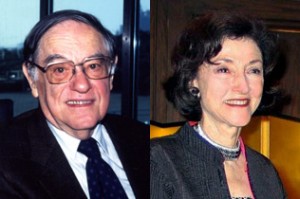
Columbia University Professor Emeritus Donald Keene, left, will talk with Carol Gluck at Japan Society's Farewell Evening with Donald Keene June 13. (Courtesy of Japan Society)
By JQ magazine editor Justin Tedaldi (CIR Kobe-shi, 2001-02) for Examiner.com. Visit his page here for related stories.
This evening (June 13), New York’s Japan Society adds another page to its storied history by hosting the Farewell Evening with Donald Keene, a final talk with Columbia University’s Professor Emeritus and Shincho Professor Emeritus of Japanese Literature.
A scholar, author and translator for over 50 years, Keene is a paragon in the field of Japanese studies. As the translator of legendary works from Mishima, Chikamatsu and Bashō and the writer of dozens of books in his own name (some written in Japanese), Keene’s achievements in bringing the island nation’s culture closer to the West are incalculable.
Upon his decision to retire this spring and become a Japanese citizen, the indefatigable Keene—who turned 89 last week—will speak at Japan Society about his appreciation for Japan, its literature and culture, his recollections of the past, and his hopes for the future as he discusses what motivated him to move permanently to Japan in light of the recent tsunami and earthquake. Moderated by his Columbia University colleague (and fellow celebrated Japanologist) Carol Gluck, the evening will be full of memories.
JQ Magazine: JQ&A with Masahiro Kozuma of the Japanese Children’s Society
By Stacy Smith (Kumamoto-ken CIR, 2000-03) for JQ magazine. Stacy is a professional writer/interpreter/translator. She starts her day by watching Fujisankei’s newscast in Japanese, and shares some of the interesting tidbits and trends together with her own observation in the periodic series WITLife.
At a gathering of the Battenkai, or Kyushu-ite group here in New York City, I had the pleasure of sharing a mirthful moment with Mr. Masahiro Kozuma. We were taking part in “laughter yoga” with the guest teacher at the event, who paired us up as partners with the task of performing a laughing exercise together. As we had just met this could have been a somewhat awkward activity to have to engage in, but thanks to Mr. Kozuma’s willingness I was able to ease into simulated laughter until it became real and I enjoyed the moment.
Later in the evening we continued our non-verbal communication with an actual conversation, where I learned that Mr. Kozuma serves as Director of the Japanese Children’s Society or New York Ikuei Gakuen (育英学園). This NPO established in 1979 provides Japanese education to youngsters with the motto of “Carefree Learning, Nurturing of Self-Training Children.” I had the chance to talk further with Mr. Kozuma about his background and that of his school.
What brought you to Battenkai?
I decided to join as I am from an area of Fukuoka Prefecture called Chikuhou. Fukuoka is blessed with beautiful nature like the mountains and the sea, and the Chikuhou region is known for coal mining. My childhood memories are of playing all the time on the huge heaps of coal waste that could be found around where I lived.
What was your path to the States?
While in Japan I got my master’s in Special Education, and I decided to come to here for further study in this field. In Japan the extent of my work experience was a part-time job at a fish store during university, but my first job here in the States was being an elementary school teacher at Japanese (supplemental study) school. I was also a counselor at their summer camp.
And now you work as director of Ikuei Gakuen, which has several schools throughout the New York area. Can you tell us a little about your system of education?
As director, I am in charge of all the schools which include the main Manhattan one, one in Port Washington, Long Island and the New Jersey campus where my office is located. Our curriculum is based on the standards set by the Ministry of Education in Japan, but it is bilingual learning as we have daily English classes. The subjects we cover are Japanese, English, math, science, social studies, music, arts and crafts, calligraphy and physical education. We also have special seasonal events like Field Day and school festivals. On the East Coast, we are the only full-time, integrated Japanese school for children ages 3 to 12.
In terms of supplemental study, we have Saturday and Sunday school as well for students who might attend regular school during the week, but still want to keep up with their Japanese education. We also do homeschooling for those who are unable to make the weekend classes.
Do you have to be Japanese to attend Ikuei Gakuen, or is it open to anyone? What is the procedure for getting in?
It is not limited to Japanese people, but the fact that classes are conducted in Japanese means that your language skills must be up to a certain level. We do have some students who are not from Japan, but who have one parent who is Japanese, etc. For all applicants we carry out screenings and a test, and provided they can pass and have developmental skills appropriate for their age they will be accepted. In circumstances where special individual treatment is necessary such as with learning disorders, we consider those on a case by case basis. Our school’s purpose is not preparing students for college entrance exams, as some might think.


